#her the moment I finish
Explore tagged Tumblr posts
Text
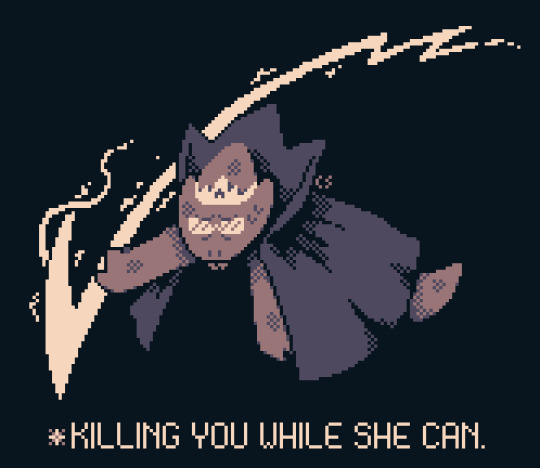
Vs. Queen Alphys
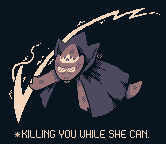
#i love the queen alphys ending so much. i love alphys so much#ah! this is a 2 bit piece unless I'm counting wrong! cool :)#(the palette I worked with was wider but I wanted to keep picking from it minimally)#pixel art#digital art#aseprite#alphys#fanart#undertale#i should probably sit on my pixelart pieces for a while before posting them bcs Tiny Things Escape Me but? I am too impatient sorry you get#her the moment I finish
573 notes
·
View notes
Text

quick existential crisis vibe check 👍
#bg3#baldur's gate 3#karlach#astarion#wyll#durge#oc: noon#i could elaborate but i'm not sure how#it's funnier this way#play an embrace durge who does a 180 at the temple due to a moment of clarity it's fun#see her broken horns also</3<3 a process has occurred#*kicks myself to finish and post these!!!*#it did NOT take even me this long to do this since the last shenang piece lol#i'm just always working on multiple things at the same time and stuff piles up
1K notes
·
View notes
Text
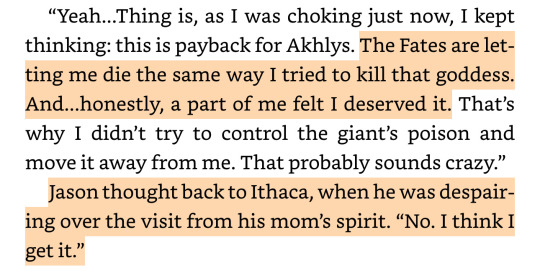
yeah so this was insane
#i feel like too many people reduce this interaction to jason being like ‘lol same’#but idk :/#this chapter is from jason’s pov#and leading up to it he’s like ‘people keep walking on eggshells around me bc of the the michael varus stab wound’#and he hates it so when he goes on deck to help out with the storm#everyone’s like wtf except for percy#and jason states how much he appreciated percy not treating him like a sick kid#and i feel like it’s echoed in this sentiment where jason could say so many things like#‘you should never feel that way’ ‘im here if you need anything’#but he doesn’t make percy feel alone in his desire to just…. end it all#which ik for some people that doesn’t work but you’re not a character in hoo and percy is dealing with so much guilt#and he can’t tell annabeth bc she’s a main aspect of that guilt#and he doesn’t wanna guilt her more and he feels ashamed and when he describes this he feels weird for feeling it#so having jason this tough guy be like ‘yo i understand it bc i felt the same way#that’s gotta mean a lot to percy#also insane how jason who also struggles to display vulnerability#allows it in one of few times in this moment just so percy this guy he’s supposed to be jealous about#feels comforted and not alone in his guilt and shame#and also it’s just insane how jason’s wanting to kay em ess does not get talked about AT ALL#and just seeing his mom and the pressure of new rome getting to him#like this scene is insane and i’ll never shut up about it#also ignore me i’m just finishing my reread of hoo that took all summer#jason grace#percy jackson#pjo#ashla.txt
1K notes
·
View notes
Text
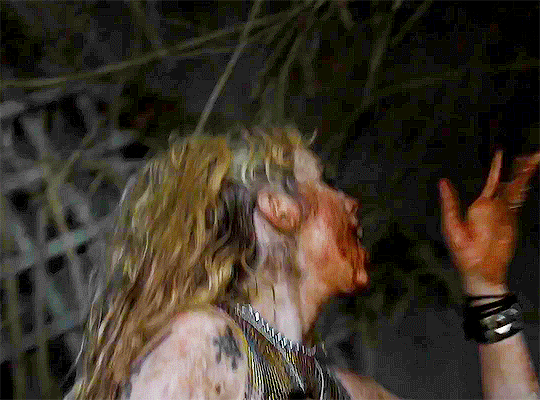

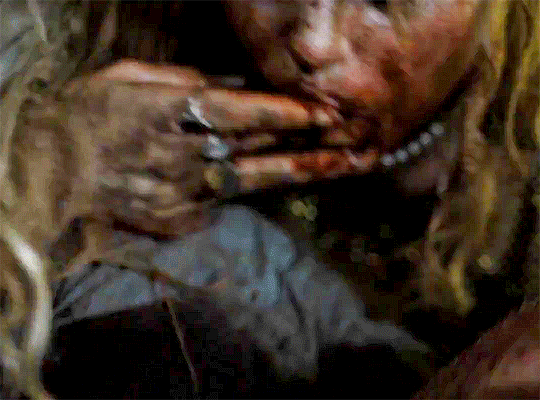


KATHRYN NEWTON in ABIGAIL (2024)
#abigail#abigail 2024#horroredit#abigailedit#kathryn newton#knewtonedit#kathrynnewtonedit#filmedit#my edits#mine: horror#i had to gif her the moment i finished watching this
2K notes
·
View notes
Text
Prompt 261
“So is no one going to talk about the eldritch space child or…”
“I mean, do you want to get between a child and Batman? I think the only one who could even get close right now is Superman…”
“No you’re right, I think- oh my god the eldritch space child is playing with batman’s bat-ears and he’s not doing anything about it what the fuck I thought only Robins could get away with that-”
#DCxDP#DPxDC#Prompts#Alfred is Clockwork#AndCW having adopted Danny means Danny gets to meet his new big brother from another timeline#Bruce (Once Alfred confirms) is absolutely attached within moments#Autistic bois unite & talk for hours about hyperfixations#Clark has had time to make an entire homemade pie at this point#No Danny isn’t ghost king nor is Clockwork Cronus#Bruce: I have only had a baby brother for 5 hours but if anything happens to him I will let my kids break all the rules & kill everyone her#Signal: Yeah definitely Alfred’s he glows like him and everything#The rest of the bats: Alfred does what now-#Danny with dozens of big star eyes to Bruce: How would you feel about sisters#Bruce holding 3 children & 1 young adult: I am big brother now#Alfred scathingly says that Someone in the family *cough Jazz cough* will at least finish college & get their degree#Sometimes CW enjoys turning off his future-vision and vibing as a mostly-mortal#And Gotham is an old war buddy of his (Yes Gotham is the city equivalent of an Ancient) from the [Redacted] era of the Realms#And xer son & daughter are adorable- Bludhaven & Arkham love the vigilantes lots
2K notes
·
View notes
Text

I started drawing this next day after I finished Act 6
13 or so days and it's finished!
Main things are traditional and Loop's body was edited digitally after
Unedited it looks like this

I've been torn on how to do Loop's body for the entirety of lining, also

A bit sad the main lines are visible only as a wip, most of this thing is literally just a ton of sharp lines
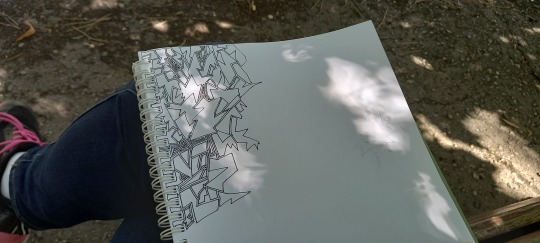
I think it's also my first day of drawing, Loop is just a sketch here (feat. my leg)

I even finished the beans before it so they were a moral support, because if you let me things like this take a year
#fanart#my art#isat#isat fanart#in stars and time#isat loop#loop#traditional art#artists on tumblr#Phew#So anyway this was my way of figuring out my thoughts after finishing the game#I didn't even actually finish it with credits playing at that moment#This type of art is my therapy#And in a way literally how my personality works from big figures to small details of thinking about anything#It's really calming!#I won't tag paper figures but they're here#Like special guests#In any case the funniest thing was showing this to my English teacher and she was like 'wow this looks stressed' or something#Like she immediately looked at the lines and after I showed her my old Flowey drawing like this she was like#'oh it makes sense! This one looks calm but this one is clearly you not feeling good'#Because I was kinda#Like sitting there in the semi-park and feeling sick since morning before I started drawing this and slowly I got better#I already talked about this on my first 'big' isat thing - I needed to think a bit#And not think at the same time just literally letting myself sort stuff out#Like. I fell asleep at 6 am that day and woke up at 10 4 hours of sleep after playing full Act 5 and two hats stuff IS STRESSFUL#SUPER STRESSFUL! Like I felt like I was playing for 4 hours while sleeping#Anyway by the time I finished it aka today I'm feeling way better and I'm literally talking a walk right now#Touching grass as we speak#Anyway phew!#Now to that animatic that's plaguing my mind to draw it nowww
893 notes
·
View notes
Text
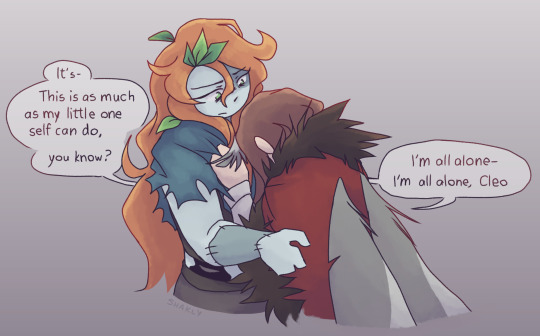
Pearl and Cleo as requested via commission (Thank you so much!)
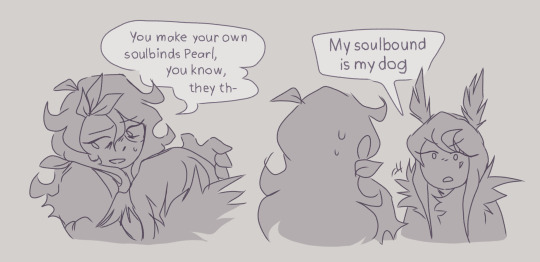
+ a little bonus
#pearlescentmoon#zombiecleo#trafficblr#not intended to be shippy but view as you wish(?)!!#This moment tugged so much at my heartstrings but like. so does Pearl in general in Double Life poor gal#and then Cleo burnt her bridge house down with intent to kill her dog but its okay we forgive Cleo because. It's Cleo. They can do that#my hands are really good I know. I do just draw blobs in the vague shapes of hands and I dont realize it until I've already finished it#commission#tubby art
1K notes
·
View notes
Text

He is HER Buggaboy!
#woop finally finished this one#i drew the original sketch for this months ago around when Passion came out#i love my kwami swap babies#they're just so precious#yes lady noire would maul someone at a moments notice#but she's such a sweet kibby for her buggaboy#meanwhile misterbug is a cinnamon roll too pure for this world#adrien agreste#marinette dupain cheng#misterbug#lady noire#misternoire#ladynoir#kwami swap#miraculous ladybug#miraculous ladybug fanart#miraculous fanart#selkie draws
3K notes
·
View notes
Note
Bit of a weird question, but what is your overall least favorite thing about MLP? 
Sparity.
#magicalgrimm#ask me#there’s a later season episode (post spike getting wings) that Tulli and I could not finish because it was so awful#where rarity’s feeling lonely without spike who’s grown up and moved on from his crush on her#so she gets extremely clingy and manipulatey to get this. teenage boy to pay attention and worship her again#and rarity gets visibly jealous of spike spending time with another teenage dragon girl#it’s extremely extremely creepy. by FAR rarity’s absolute worst rock bottom moment#actual textbook groomer behavior#and even worse the episode kinda shits on rarijack where rarity tried to replace spike with applejack in helping her#but aj fails and fucks things up and isn’t right for the job. so the episode implies spike is a better match with rarity than applejack#it’s just all sorts of wrong eugh.#sparity just sucks so bad I can’t believe a good chunk of bronies still ship them or consider them a viable ship#I’m fine with spike having a kid crush on rarity it happens with kids#but the more the writers just kept teasing and toying and baiting it. overstayed its welcome#especially because they have no chemistry. spike doesn’t have a reason for liking rarity other than “hot woman in her mid-20s’
513 notes
·
View notes
Text
beloved

#busy with commissions at the moment but i just finished the first batch of sketches so im rewarding myself by drawing her#cho hyunju#squid game#squid game 2#hyunmi#fanart#player 120#hyunju squid game#motherdanger art
182 notes
·
View notes
Text
patience being tested. being forced by a bizarre unfortunate situation to adhere to university requirement technicality by taking this simple basic elementary "introduction to environmental history" class.
this class is from facilitators/program which do, like, "history of the American frontier" or "history of fishing and hunting" and still basically subscribe to that old-school twentieth-century idealization and celebration of characters like Teddy Roosevelt and reverence for a mythical arc-of-history-bent-towards-justice narrative of the often-clumsy but ultimately-benevolent US federal government and its mission to "save nature" through the miracle of "sustained yield," while heroic federal land management agencies and "heritage" institutions lead to way, staffed by exceptional individuals (appeals to nostalgia for the frontier and an imagined landscape of the American West; ego-stroking appeals to flattering self-image that center the environmentalist or academic). where they invoke, y'know, ideas like "ecology is important because don't you enjoy cross-country skiing in The Woods with your niece and nephew? don't you like hunting and fishing?" which makes it feel like a time capsule of appeals and discourses from the 1970s. and it invokes concept of "untouched wilderness" (while eliding scale of historical Indigenous environmental relationships and current ongoing colonial violence/extractivism). but just ever-so-slightly updated with a little bit of chic twenty-first-century flair like a superficial land acknowledgement or a reference to "labor histories" or "history from below," which is extra aggravating when the old ideologies/institutions are still in power but they're muddying the water and diluting the language/frameworks (it's been strange, watching words like "multispecies" and "Anthropocene" over the years slowly but surely show-up on the posters, fliers, course descriptions, by now even appearing adjacent to the agri-business and resource extraction feeder programs, like a recuperation or appropriation.) even from a humanities angle, it's still, they're talking at me like "You probably didn't know this, but environmental history is actually pretty entangled with political and social events. In fact, we can synthesize sources and glean environmental info from wacky places like workers' rolls in factories, ship's logs, and poetry from the era." and i'm nodding like YEP.
the first homework assignment is respond to this: "Define and describe 'the Anthropocene'. Do you think 'the Anthropocene' is a useful concept? Why or why not?" Respond in 300 words.
so for fun, right now in class, going to see how fast i can pull up discussion of Anthropocene-as-concept solely from my old posts on this microblogging site.
---
ok, found some
---
I think that the danger in any universal narrative or epoch or principle is exactly that it can itself become a colonizing force. [...] I’m suspicious of the Anthropocene as concept for the very reason that it subsumes so many peoples, nations, histories, geographies, political orders. For that reason, I think ideas like the Anthropocene can be a useful short-hand for a cluster of tangible things going on with the Earth at the moment, but we have to be very careful about how fluid and dynamic ideas become concretized into hegemonic principles in the hands of researchers, policymakers, and politicians. There’s so much diversity in histories and experiences and environmental realities even between relatively linked geographies here in Canada [...]. Imagine what happens when we try to do that on a global scale - and a lot of euro-western Anthropocene, climate change and resilience research risks doing that - eliding local specificities and appropriating knowledge to serve a broader euro-western narrative without attending to the inherent colonial and imperial realities of science and policy processes, or even attending to the ways that colonial capitalist expansion has created these environmental crises to begin with. While we, as a collective humanity, are struggling with the realities of the Anthropocene, it is dangerous to erase the specific histories, power-relations, political orders that created the crisis to begin with. So, I’m glad that a robust critique of the Anthropocene as a concept is emerging.
Text by: Words of Zoe Todd, as interviewed and transcribed by Caroline Picard. “The Future is Elastic (But it Depends): An Interview with Zoe Todd.” 23 August 2016.
---
---
---
The Great Acceleration is the latest in a series of human-driven planetary changes that constitute what a rising chorus of scientists, social scientists, and humanists have labeled the Anthropocene - a new Age of Humans. [...] But what the Anthropocene label masks, and what the litany of graphs documenting the Great Acceleration hide, is a history of racial oppression and violence, along with wealth inequality, that has built and sustained engines of economic growth and consumption over the last four centuries. [...] The plantation, Sidney Mintz long ago observed, was a “synthesis of field and factory,” an agro-industrial system of enterprise [...]. Plantation legacies, along with accompanying strategies of survival and resistance, dwell in the racialized geographies of the United States’ and Brazil’s prison systems. They surface in the inequitable toxic burdens experienced by impoverished communities of color in places like Cancer Alley, an industrial corridor of petrochemical plants running along the Mississippi River from New Orleans to Baton Rouge, where cotton was once king. And they appear in patterns of foreign direct investment and debt servitude that structure many land deals in the Caribbean, Brazil, and sub-Saharan Africa [...]. [C]limatologists and global change scientists from the University of London, propose instead 1610 as a date for the golden spike of the Anthropocene. The date marked a detectable global dip in carbon dioxide concentrations, precipitated, they argue, by the death of nearly 50 million indigenous human inhabitants [...]. The degradation of soils in the tobacco and cotton-growing regions in the American South, or in the sugarcane growing fields of many Caribbean islands, for example, was a consequence of an economic and social system that inflicted violence upon the land and the people enslaved to work it. Such violent histories are not so readily evident in genealogies that date the Anthropocene’s emergence to the Neolithic Revolution 12,000 years ago, the onset of Europe’s industrial revolution circa 1800, or the Trinity nuclear test of 1945. Sugarcane plantations were already prevalent throughout the Mediterranean basin during the late middle ages. But it was during the early modern era, and specifically in the Caribbean, where the intersection of emerging proto-capitalist economic models based on migratory forced labor (first indentured servitude, and later slavery), intensive land usage, globalized commerce, and colonial regimes sustained on the basis of relentless racialized violence, gave rise to the transformative models of plantations that reshaped the lives and livelihoods of human and non-human beings on a planetary scale. [...] We might, following the lead of science studies scholar Donna Haraway and anthropologist Anna Tsing, more aptly designate this era the Plantationocene. [...] It is also an invitation to see, in the words of geographer Laura Pulido, “the Anthropocene as a racial process,” one that has and will continue to produce “racially uneven vulnerability and death." [...] And how have such material transformations sustained global flows of knowledge and capital that continue to reproduce the plantation in enduring ways?
Text by: Sophie Sapp Moore, Monique Allewaert, Pablo F. Gomez, and Gregg Mitman. "Plantation Legacies." Edge Effects. 22 January 2019. Updated 15 May 2021. [Bold emphasis added by me.]
---
---
---
Geologists and other scientists will fight over [the definition of the beginning start-date of the Anthropocene] in scientific language, seeking traces of carbon dioxide that index the worst offenses of European empire which rent and violated the flesh, bodies, and governance structures of Indigenous and other sovereign peoples in the name of gold, lumber, trade, land, and power. [...] The stories we tell about the origins of the Anthropocene implicate how we understand the relations we have with our surrounds. In other words, the naming of the Anthropocene epoch and its start date have implications not just for how we understand the world, but this understanding will have material consequences, consequences that affect body and land.
Text by: Heather Davis and Zoe Todd. On the Importance of a Date, or Decolonizing the Anthropocene. ACME An International Journal for Critical Geographies. December 2017. [Bold emphasis added by me.]
---
---
---
From Aime and Suzanne Cesaire, C. L. R. James, Claudia Jones, Eduoard Glissant, through Sylvia Wynter, Christina Sharpe, and so many others, critical anticolonial and race theory has been written from the specific histories that marked the Black Atlantic. [...] Glissant also reminds us, secondly, of how cunning the absorptive powers of [...] liberal capitalism are - how quickly specific relations are remade as relations-erasing universal abstractions. [...] This absorptive, relations-erasing universalism is especially apparent in some contemporary discourses of […] liberalism and climate collapse - what some call the Anthropocene - especially those that anchor the crisis in a general Human calamity which, as Sylvia Wynter has noted, is merely the name of an overdetermined and specific [White] European man. […] [T]he condition of creating this new common European world was the destruction of a multitude of existing black and brown worlds. The tsunami of colonialism was not seen as affecting humanity, but [...] these specific people. They were specific - what happened to them may have been necessary, regrettable, intentional, accidental - but it is always them. It is only when these ancestral histories became present for some, for those who had long benefitted from the dispossession [...], that suddenly the problem is all of us, as human catastrophe.
Text by: Elizabeth Povinelli. “The Ancestral Present of Oceanic Illusions: Connected and Differentiated in Late Toxic Liberalism.” e-flux Journal Issue #112. October 2020.
---
The narrative arc [of White "liberal humanism"] [...] is often told as a kind of European coming-of-age story. […] The Anthropocene discourse follows the same coming-of-age [...] script, searching for a material origin story that would explain the newly identified trajectory of the Anthropos […]. Sylvia Wynter, W.E.B. DuBois, and Achille Mbembe all showed how that genealogy of [White subjecthood] was [...] articulated through sixteenth- through nineteenth-century [historiographies and discourses] in the context of colonialism, [...] as well as forming the material praxis of their rearrangement (through mining, ecological rearrangements and extractions, and forms of geologic displacements such as plantations, dams, fertilizers, crops, and introduction of “alien” animals). […] As Wynter (2000) commented, “The degradation of concrete humans, that was/is the price of empire, of the kind of [Eurocentric epistemology] that underlies it” (154).
Text by: Kathryn Yusoff. “The Inhumanities.” Annals of the American Association of Geographers, Volume 11, Issue 3. November 2020.
---
---
---
As Yarimar Bonilla suggests in regard to post-Irma-and-Maria Puerto Rico, “vulnerability is not simply a product of natural conditions; it is a political state and a colonial condition.” Many in the Caribbean therefore speak about the coloniality of disaster, and the unnaturalness of these “natural” disasters [...]. Others describe this temporality by shifting [...] toward an idea of the Plantationocene [...]. As Moore and her colleagues write, “Plantation worlds, both past and present, offer a powerful reminder that environmental problems cannot be decoupled from histories of colonialism, capitalism, and racism that have made some human beings more vulnerable [...].” [W]e see that contemporary uneven socioecologies associated with the rise of the industrial world ["the Anthropocene"] are based [...] also on the racialized denial and foreshortening of life for the sacrificial majority of black, brown, and Indigenous people and their relegation to the “sacrifice zones” of extractive industry. [...] [A]ny appropriate response to the contemporary climate emergency must first appreciate its foundations in the past history of the violent, coercive, transatlantic system of plantation slavery; in the present global uneven development, antiblackness, and border regimes that shape human vulnerability [...] that continues to influence who has access to resources, safety, and preferable ecologies [...] and who will be relegated to the “plantation archipelagoes” (as Sylvia Wynter called them) [...].
Text by: Mimi Sheller. “Thinking Beyond Coloniality: Toward Radical Caribbean Futures.” Small Axe (2021), 25 (2 (65)), pages 169-170. Published 1 July 2021. [Bold emphasis added by me.]
---
---
---
Indigenous genocide and removal from land and enslavement are prerequisites for power becoming operationalized in premodernity [...]; it was/is a means to operationalize extraction (therefore race should be considered as foundational rather than as periphery to the production of those structures and of global space). [...] Wynter suggests that we […] consider 1452 as the beginning of the New World, as African slaves are put to work on the first plantations on the Portuguese island of Madeira, initiating the “sugar-slave” complex - a massive replantation of ecologies and forced relocation of people […]. Wynter argues that the invention of the figure of Man in 1492 as the Portuguese [and Spanish] travel to the Americas instigates at the same time “a refiguring of humanness” in the idea of race. [...] The natal moment of the 1800 Industrial Revolution, […] [apparently] locates Anthropocene origination in […] the "new" metabolisms of technology and matter enabled by the combination of fossil fuels, new engines, and the world as market. […] The racialization of epistemologies of life and nonlife is important to note here […]. While [this industrialization in the nineteenth century] […] undoubtedly transformed the atmosphere with […] coal, the creation of another kind of weather had already established its salient forms in the mine and on the plantation. Paying attention to the prehistory of capital and its bodily labor, both within coal cultures and on plantations that literally put “sugar in the bowl” (as Nina Simone sings) […]. The new modes of material accumulation and production in the Industrial Revolution are relational to and dependent on their preproductive forms in slavery […]. In 1833, Parliament finally abolished slavery in the British Caribbean, and the taxpayer payout of £20 million in “compensation” [paid by the government to slave owners for their lost "property"] built the material, geophysical (railways, mines, factories), and imperial infrastructures of Britain and its colonial enterprises and empire. [...] A significant proportion of funds were invested in the railway system connecting London and Birmingham (home of cotton production and […] manufacturing for plantations), Cambridge and Oxford, and Wales and the Midlands (for coal). Insurance companies flourished [...]. The slave-sugar-coal nexus both substantially enriched Britain and made it possible for it to transition into a colonial industrialized power […]. The slave trade […] fashioned the economic conditions (and institutions, such as the insurance and finance industries) for industrialization.
Text by: Kathryn Yusoff. "White Utopia/Black Inferno: Life on a Geologic Spike". e-flux Journal Issue #97. February 2019. [Bold emphasis added by me.]
#sorry for being mean#instructor makes podcasts about cowboys HELP ME#and he recently won a New Business award for his startup magazine covering Democrat party politics in local area HELP#so hes constantly performing this like dance between new hip beerfest winebar coolness and oldfashioned masculinity#but hes in charge of the certificate program so i have to just shut up and keep my head down for approximately one year#his email address is almost identical to mine and invokes enviro history terms but i made mine long before when i was ten years old#so i could log in to fieldherpforum dot com to talk about enviro history of distribution range changes in local reptiles and amphibians#sir if you read my blog then i apologize ive had a long year#and i cant do anything to escape i am disabled i am constantly sick im working fulltime i have NO family i have NO resources#i took all of this schools graduate level enviro history courses and seminars years ago and ran the geography and enviro hist club#but then left in final semester because sudden hospitalization and crippled and disabled which led to homelessness#which means that as far as any profession or school is concerned im nobody im a retail employee#i was doing conference paper revisions while sleeping on concrete vomiting walking around on my cane to find outdoor wifi#and im not kidding the MONTH i got back into a house and was like ok going back to finish the semester the school had#put my whole degree program and department in moratorium from lack of funding#and so required starting some stuff from scratch and now feel like a hostage with debt or worsening health that could pounce any moment#to even get back in current program i was working sixteen hours a day to pay old library fines and had to delicately back out of workplace#where manager was straight up violently physically abusive to her vulnerable employees and threatened retaliation#like an emotional torturer the likes of which i thought existed only in cartoons#and the week i filed for student aid a massive storm had knocked out electricity for days and i was clearing fallen tree debris#and then sitting in the dark in my room between job shifts no music no phone no food with my fingers crossed and i consider it a miracle#sorry dont mean to dramatize or draw attention to myself#so actually im happy you and i are alive
134 notes
·
View notes
Text
yall ever think Shen Yuan went through like, internet withdrawal after being transmigrated into Shen Qingqiu? Like, he's canonically a NEET shut-in who did nothing but spend his time online, you can't tell me that for the first week or first few weeks of being SQQ he wasn't twitchy.
Like, reaching instinctively to his pockets for a phone that wasn't there, having an obsessive itch in the back of his mind that he should check and see if X or Y novel or webcomic has updated -- only to realize he can't anymore and being irritated by it. Wanting to go and see if there's new posts about this or that, but again realizing that he can't.
When he's bored or uncomfortable or just feels like wanting to escape he tries to go for his phone to distract himself, but oops! Not there anymore, and now he has to find a new and different way to distract himself from his feelings. And going through system notifications, quests, etc only does so much.
And there's that Tetris Effect too. SQQ makes a mistake while writing and instinctively goes to backspace on it except hey-ho that's not a keyboard and now he just dipped his pinkie into a bottle of ink or on a still-drying letter.
With him scrambling to fix his reputation and learn how to be a peak lord, I think his abrupt cold-turkey from all things internet would just be another straw on the camel's back that he promptly Ignores until it goes away on its own after he acclimates to his new surroundings.
#svsss#mxtx svsss#scum villain#scum villian self saving system#shen yuan#shen qingqiu#i think him learning how to be a peak lord and cultivation and everything else would help distract him from the internet withdrawal for the#most part. but the moment there's a lull in the day and his mind wanders or he becomes bored or stressed and he instinctively reaches back#for his phone and realizes it isn't there it just sends a spike of panic/frustration/irritation through him because its a familiar comfort#and now its gone. like this is all based off my own experiences from being Chronically Online but i just think its neat to think about#in that same vein i think it also pushes him into getting into the arts on QJP. Like as the peak lord naturally he would be doing this kind#of stuff but hes NOT the peak lord but to keep up appearances he has to know how to do this stuff. and finds it??? actually quite rewarding#even more than getting into an argument online or getting a new merch item. he's making or doing this stuff. he starts drawing and finishes#a piece and regardless of its skill level he feels something unclog in his chest. like sediment being scraped off the bottom of a creek and#being washed downstream. a weight that's been slogging through his veins suddenly untangled. physical proof of his efforts that feels great#starry is incapable of NOT giving her favorite blorbos more hobbies. starry is incapable of not giving her favorites artsy hobbies#this is probably NOT a new or original thought whatsoever but im throwing it out there anyways bc it fascinates me. i love transmigration#and albeit i've only read isekai manhwa/manhua there's a common theme of the people there assimilating into their new lives relatively quic#which i know is for ease of transition and getting to the rest of the story. but WHAT IF.#i have still not read svsss yet and idk when i'll be able to BUT have some thoughts anyways
210 notes
·
View notes
Text

clora with @lamieboo's dahlia💛🩵 i had to draw them together as soon as i saw dahlia was yellow and blue, bc their colour schemes are kinda the same, just inverted (and u all know how i love my opposites LMAO)
#i sketched this as soon as her design dropped i just havent been able to get around to finishing it😩 love it sm#ive also been wanting to draw clora with a headband for a while so this gave me the excuse#dahlia helping clora ✨accessorize✨#cue 90s tropey movie moment where the nerdy shy girl gets a makeover from the girly girl LMAO#i wanted them to have matching pigtails at first but clora looks sooooo cursed with pigtails dont ask me why idk#hogwarts legacy mc#dahlia pot#clora clemons#hogwarts legacy oc#choccyart#the 'like yknow...nyah' thing is an existing meme and it reminded me of dahlia LMAO it came to me as i was drawing her ariana grande sleeve#i also redrew that same meme for my last fandom/on my main non HL art acc.....i just love it so much
394 notes
·
View notes
Text
Can't stop thinking about how Agatha tries so hard to be closed and mysterious about her past/feelings but then Rio comes throwing all that shit in the fan by saying things like "she's my scar" in front of a whole fucking coven of fruity misfits
#rio doesn't even try to pretend she's not talking about agatha#she literally finishes her speech and stares agatha's soul with those big brown eyes of her#rio vidal#agatha harkness#agatha all along#i fucking love this show#marvel#lesbian#lilia calderu#jennifer kale#alice wu gulliver#i want so bad for them to chat about the whole “she's my scar” moment
167 notes
·
View notes
Text

#kirby#daily kirby#my art#digital#hal laboratory#nintendo#I read so much tamora pierce as a kid#both circle and tortall#though I was more partial to tortall overall#I haven't reread any of them in a while#but it occurred to me somewhat recently that like. I basically did a keladry irl#I just got sick before I could finish#(combat roles were closed to 'females' until literally the day I signed the paperwork in 2015)#(like I'd already chosen something else but the recruiters called me later that day like 'hey they just changed the rules')#(I wasn't The First to go into training and so on because I was partway through my last quarter of college)#(altho kel was too young to take advantage the moment the law changed it's just that no one else tried first in her case)#but idk I spent a long time kinda pretending it never happened for Complicated Brain Reasons#so I don't think it's fully sunk in yet still
101 notes
·
View notes
Text



If I don't make light of everything, I'm gonna explode.
#BNHA#Boku No Hero Academia#MHA#My Hero Academia#Shouto Todoroki#Touya Todoroki#Dabi#Natsuo Todoroki#Rei Todoroki#Fuyumi Todoroki#Todofam#Lady Nagant#Kaina Tsutsumi#Hawks#Keigo Takami#Spinner#Shuichi Iguchi#Bnha 426#mha 426#bnha spoilers#My Art#i have a lot of gripes with this chapter including touya's future and the minimal interactions between all the siblings#him and shouto had such a good moment though so im happy about it!! ive had this hc that touya likes soba too for so longgg#i screamed when i turned out right!!#and the apology...i hope this is another thing where the docs turn out to be wrong about him. he did awful things but this is not his endin#also the image of touya with his cute hair but the dabi scars and his coat... ahhh pain#i'll restrain myself from commenting too much because im kind of disappointed and very sad#gotta say i was mad excited about a kaina appearance bc unfortunately her chara has been handled SO badly start to finish; wasted potential#But at least we get her pretty face so I'll take the crumbs (< I need to be in lesbians with her)#and now this JAIL ENDING baby no get out of there and beat some sense into your kohai
174 notes
·
View notes